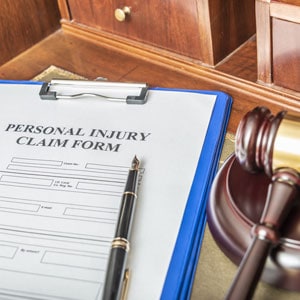
The legal system can be incredibly intimidating for everyday people. A good lawyer will walk you through the legal process, explain your rights and responsibilities, and help you move forward on the best foot possible. Your attorney will also help you understand what your injuries are truly worth and make sure you get the most meaningful compensation possible. In this article, we’ll break down the basics of personal injury claims and the terms that are used along the way.
Keep reading to discover…
- How liability impacts your personal injury claim
- The type of damages you may be entitled to in Texas.
- How long you have to file a personal injury claim.
What Is “Liability,” And What Does It Mean In The Context Of Personal Injury Law?
Liability means legal responsibility. For example, we all have a responsibility to drive safely and carefully on the road. Likewise, an employer is responsible for making sure his workers are safe while on the job.
When someone fails in their duty and someone is harmed as a result, they are liable or legally responsible for the injuries and damage that result.
How Is “Negligence” Defined In Texas, And Why Is It Important?
Negligence means failing to do what a person with ordinary levels of care would do in that situation. If a sensible person would not have behaved in that way and the results of those actions were foreseeable, the action can be described as “negligent.”
For example, driving a car when fatigued. A person with reasonable levels of care and caution would pull over to sleep. Likewise, the result of choosing to drive while drowsy is predictable; the person is distracted and more likely to cause a crash.
Whenever someone does something a reasonable person would not have done or fails to do something that a reasonable person would have, and someone is hurt as a result, this is negligence.
What Are “Damages,” And What Types Can Typically Be Claimed In A Personal Injury Case?
Damages are the expenses that you can recover through a personal injury claim when someone has been negligent and caused you harm. Generally, these fall into economic and non-economic categories.
Economic damages, for example, would cover reasonable and necessary medical expenses as well as expenses for future care. You can also recover lost wages if the accident caused you to take time away from work, or recover future wages if the accident was so severe that you’re no longer able to work.
Non-economic damages you may be able to recover include compensation for pain and suffering, and the emotional and mental anguish of the accident and its effects on your life. Other non-economic damages can cover disfigurement (such as scarring) or physical impairment (such as walking with a limp as a result of the accident).
There is no calculator to tally non-economic damages; it takes a skilled lawyer to explain to a jury what that pain looks and feels like and how much it has cost you.
What Is The Difference Between A “Trial” And A “Settlement”?
A settlement is an out-of-court resolution. During a settlement, both parties agree to settle the case for a certain amount that is paid to the injured party so that the case doesn’t have to go to trial. Most cases settle out of court.
A trial happens as the end result of filing a lawsuit against the party who caused your injuries. At a trial, you and your attorney prepare a case to be presented to a jury in a courtroom. In the end, the jury makes a judgment call on liability and the damages you’re owed after hearing evidence from both sides.
While a settlement offers more predictability, your lawyer should also be prepared to go to trial if a reasonable settlement amount can not be agreed on. Presenting a strong case before a jury can lead to higher settlement amounts if the liable party’s insurance company does not agree on a fair amount.
What Does “Burden Of Proof” Mean For My Personal Injury Case?
Whenever you are injured and you file a personal injury lawsuit, it is your burden or responsibility to prove that the other party was negligent and, therefore, liable for your injuries.
How much evidence do you and your attorney need? In personal injury cases, you need to be able to prove to a jury that the other party was more than 50% likely to have acted negligently and caused your injury.
This is called “the preponderance of evidence” and is a far lower burden of proof than the criminal standard of “beyond a reasonable doubt.” So long as you and your attorney can prove to a jury that the other party was more likely than not to have caused your injury, you have met the burden of proof.
What Are “Statutes Of Limitations,” And How Do They Affect My Claim In Texas?
The statute of limitations is the deadline for filing a lawsuit against the other party. In Texas, this time limit is two years from the date of the accident. If you wait beyond this time limit, you won’t be able to file a lawsuit in Texas or win damages.
Whenever you’re injured because of the conduct of another person, injured on the job, or injured through the fault of another party, reach out to an attorney immediately. Meeting that deadline is incredibly important, and the sooner you reach out to a lawyer, the sooner your case can begin to move forward.
Why Is It So Important To Get In Touch With A Personal Injury Lawyer Immediately?
As an injured party, it’s important to keep in mind that the other party and their insurance company are not there to help you, get you justice, or compensate you appropriately. They’re likely to get in touch with you, try to get you talking about the accident and trick you into settling for a small amount.
There are also instances where the other party’s insurance carrier will try to get rid of evidence, and it’s extremely important to reach out to a personal injury lawyer to help preserve and gather that evidence.
Let a lawyer speak to insurance carriers for you, ensure that evidence of the accident is intact, and work to represent you and get you truly appropriate damages. The best results are obtained when a client reaches out to an attorney immediately after their accident.
Your Best Interests Are Our Top Priority
Once you understand the legal process, you can stress less and focus on healing and taking care of yourself and your family. John Escamilla Law Firm will guide you not only through the legal journey but also through the medical recovery process. We can put you in touch with doctors who can treat you for injuries as they emerge, such as neck pain, vision problems, or hearing issues. You focus on your recovery, and let us focus on the lawsuit and litigation and getting you the damages your case truly merits.
Still Have Questions? Ready To Get Started?
For more information on Decoding Legal Language, a free initial consultation is your next best step. Get the information and legal answers you are seeking by calling (956) 628-7569 today.
